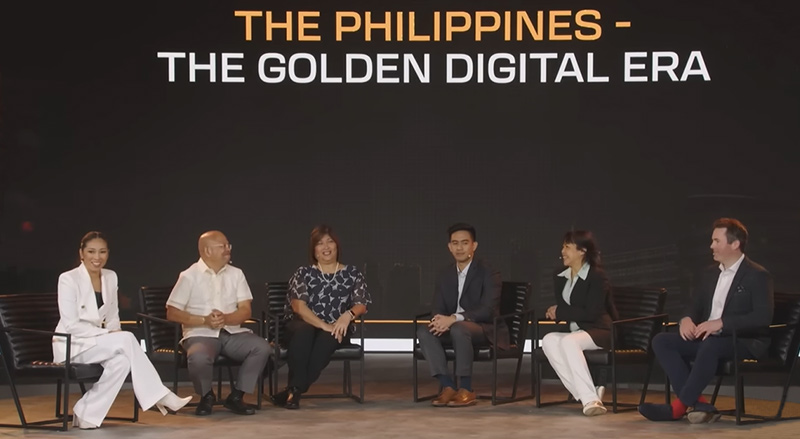At the recent London Blockchain Conference, a delegation from the Philippines gave a joint presentation entitled ‘The Philippines – The Golden Digital Era‘. The presentation consisted of several talks and included a subsequent panel discussion moderated by Stephanie Tower, Business Development Lead Philippines at nChain.
The talks were held by:
- Kelvin Lester King Lee – Commissioner of the Philippine Securities and Exchange Commission;
- Edwin Ligot – Assistant Secretary, Department of Information and Communications Technology;
- Christina M. Garcia – Vice Governor of the Province of Bataan;
- Kara Mei Herrera – Provincial Focal Person on Blockchain Applications in CBMS;
- Joseph Silvino Pagdanganan – Provincial Focal Person on Blockchain Technology, Province of Bataan.
The following panel discussion was joined by:
- Christine Leong – CIO at nChain;
- Christina M. Garcia – Vice Governor of the Province of Bataan, Philippines;
- Christian Pulmano – Ateneo Blockchain Lab Head at Ateneo de Manila University;
- James Marchant – Executive Chairman of Block Dojo.
Showcasing blockchain tech in the Philippines
Commissioner Calvin Lester Kaili of the Philippine Securities and Exchange Commission discussed the ease of doing business in the Philippines through technology and blockchain. The SEC offers innovative online services, such as electronic filing and payment options, winning awards for fintech innovation.
They plan to implement a smart contract system based on blockchain for enhanced trust and fraud prevention. Commissioner Kaili emphasised the ongoing commitment to innovate the financial landscape of the Philippines with emerging technologies.
Edwin Ligot, Assistant Secretary for Infrastructure Development at the Department of Information and Communications Technology, emphasised the Philippines’ digital transformation and the importance of the fourth Industrial Revolution, integrating advanced technologies like AI and IoT. He highlighted the need to harness data for economic growth, environmental sustainability, and social protection. Ligot discussed the government’s digital-first approach, focusing on technologies like blockchain and the National ICT Project for streamlining government services and digital IDs.
The provincial government of Bataan, led by Vice Governor Maria Cristina Garcia, is embracing blockchain and emerging technologies to become a hub for innovation. They offer fiscal incentives to attract tech companies and have partnered with nChain to enhance government services and transparency using blockchain. Healthcare and electronic medical records are a key focus, and blockchain technology is used to improve the issuance of provincial ID cards for enhanced efficiency and security.
Kara Mei Herrera, the Provincial Focal Person on Blockchain Applications in CBMS of Bataan Province, discussed the province’s transformation through blockchain. They offer fiscal incentives to attract tech companies and have launched Global Trade X, a digital exchange for cross-border trade. Their partnership with nChain aims to enhance government services and transparency using blockchain.
Joseph Silvino Pagdangana, Provincial Focal Person on Blockchain Technology, Province of Bataan, highlighted Bataan’s commitment to harnessing blockchain possibilities, particularly in healthcare and digital IDs. They seek to achieve quality growth through technology and empower their families by addressing challenges and promoting digital skills in the digital economy.
Discussing the Philippines’ golden digital era
The panel discussion that followed included several topics such as the digital transformation of the Philippines, bridging regional data silos, regulation of blockchain and the work of institutions such as the Ateneo Blockchain Lab or the Block Dojo.
The Philippines’ digital transformation
Edwin Ligot, the Assistant Secretary for Infrastructure Development and Management, highlighted the Philippines’ commitment to digital transformation. The government is actively pursuing digitisation, with a strong focus on the fourth generation of digital technologies. Their goal is to synchronise data from various agencies to create a unified system and ecosystem for policy development, which touches on the following discussion point.
Bridging regional data silos
One challenge the Philippines faces is its regional silos in data management and infrastructure due to its archipelagic nature. Edwin Ligot acknowledged this issue and explained that the government is working on creating a framework to address these challenges. This includes establishing data centres in various regions to improve data management and connectivity.
The role of government in technology adoption
Christine Leong, an expert in digitalisation and technology, emphasised the essential role of governments as leaders and innovators in the adoption of new technology. She also explains why the involvement of governments is important for the goal of digital transformation. ‘To lead in the innovation space, like what the Philippines is doing with digital identity, eGovernment etc., those things are public goods. So it’s very difficult to do it by private sector engagement alone,’ she said.
While the private sector can offer innovative services, certain aspects like digital identity and eGovernment are considered public goods and require government involvement. She further references a European government that she worked with previously, which had to change laws to ‘accept and issue digital identities’.
Training and upskilling talent in emerging technologies
Christian Pulmano, from Ateneo de Manila University, shared insights into the Ateneo blockchain lab, focusing on providing a safe environment for students to learn about blockchain technology. The lab’s objectives include equipping students with the knowledge and skills required to implement blockchain effectively to address real-world problems. This educational approach is crucial for preparing the next generation of problem-solvers and innovators.
James Marchant emphasised the importance of training in blockchain technology. For him, there are two aspects to the educational work of the Block Dojo. ‘Education for us is two things. It’s helping entrepreneurs understand the power of the blockchain and how it can solve real-world problems. And then on the other side of the coin, it’s educating developers that can then build those products, and we put those two together and usually good things happen,’ he said.
Vice Governor Maria Cristina Garcia shared insights into the innovative use of technology for scholarship management in Bataan. The province has approximately 11,000 college scholars and has transitioned from providing cash refunds to issuing ATM cards. This move ensures safer and more convenient financial support for scholars, especially during the pandemic.
